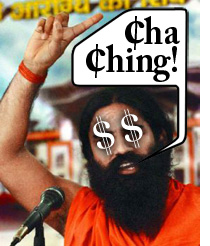
Unlooser of Our Bonds
(translation of Khandana Bhava Bandhana by
Swami Vivekananda)
We adore you, one beloved of all hearts,
Love Incarnate, blessing all by your life.
Stainless Godhead, freely taking a human form,
You have conquered human bondage and fear.
We adore you, brightest jewel of creation,
Taking from us every blemish and shame;
Form of spirit, eyes illumined with God-sight,
By your pure glance our delusion is gone.
We adore you, surging ocean of God's bliss,
Ever radiant with the nectar of love.
When we seek you with unswerving devotion,
We pass safely through the forest of life.
We adore you, come to earth in our time,
Guide to Oneness, leading us in Truth.
When, by your grace, our inner tumult ceases
Dawns the pure light deep within our hearts.
We adore you, lifter of our sorrow,
Futi or mercy, giving us your life.
By awesome effort for the good of mankind
You destroy all bondage in this age.
We adore you, greatest of renouneers,
Wholly free from passion and possession.
0 man divine, bestow on us devotion;
Grant us strength to follow after you!
we adore you, tree from doubt, ever tearless,
Standing steadfast in the vision of God,
Giving refuge to all seekers who come to you,
Caring nothing for their station or race.
We adore you, our unshakable refuge
In this ocean of delusion and pain.
At your pure love, freely showered on all alike,
Strife and sorrow dwindle down to a drop.
Victory to you, 0 Lord!
Speech and thought cannot hold you,
Yet without you we cannot think or speak.
Victory to you, 0 Lord!
Come to the heart's dark cave;
Reveal yourself in great radiance of light.
Victory to you, 0 Lord!
Remover of our pain,
Unlooser of our bonds,
Supreme and eternal good, we adore you!
RAMAKRISHNA SONGS
On the importance of Ramakrishna for India
From a lecture delivered under the auspices of the Bombay National Union by Sri Aurobindo to a large gathering at Mahajanwadi, Bombay, on Sunday, the 19th January, 1908.
The title is "The present situation".
The Bengali has the faculty of belief. Belief is not a merely intellectual process, belief is not a mere persuasion of the mind, belief is something that is in our heart, and what you believe, you must do, because belief is from God. It is to the heart that God speaks, it is in the heart that God resides. That saved the Bengali. Because of this capacity of belief, we were chosen as the people who were to save India, the people who were to stand foremost, the people who must suffer for their belief, the people who must meet everything in the faith that God was with them and that God is in them. Such a people need not be politically strong, it need not be a people sound in physique, it need not be a people of the highest intellectual standing. It must be a people who can believe.In Bengal there came a flood of religious truth.Certain men were born, men whom the educated world would not have recognised if that belief, if that God within them had not been there to open their eyes, men whose lives were very different from what our education, our Western education, taught us to admire.One of them, the man who had the greatest influence and has done the most to regenerate Bengal, could not read and write a single word. He was a man who had been what they call absolutely useless to the world. But he had this one divine faculty in him, that he had more than faith and had realised God. He was a man who lived what many would call the life of a madman, a man without intellectual training, a man without any outward sign of culture or civilisation, a man who lived on the alms of others, such a man as the English-educated Indian would ordinarily talk of as one useless to society. He will say, "This man is ignorant. What does he know? What can he teach me who have received from the West all that it can teach?"
But God knew what he was doing. He sent that man to Bengal and set him in the temple of Dakshineshwar in Calcutta, and from North and South and East and West, the educated men, men who were the pride of the university, who had studied all that Europe can teach, came to fall at the feet of this ascetic.The work of salvation, the work of raising India was begun.
Sri Aurobindo








.jpg)







 special story
special story








